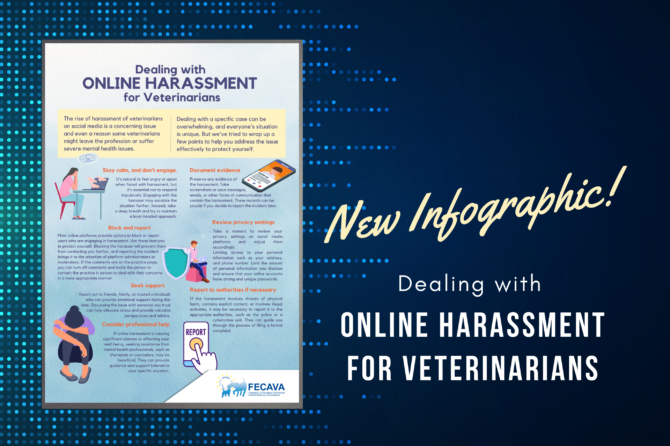
Dealing with Online Harassment for Veterinarians
The rise of harassment of veterinarians on social media is a concerning issue and even a reason some veterinarians might leave the profession or suffer severe mental health issues.
Dealing with a specific case can be overwhelming, and everyone’s situation is unique. But we’ve tried to wrap up a few points to help you address the issue effectively to protect yourself.
1. Stay calm, and don’t engage.
It’s natural to feel angry or upset when faced with harassment, but it’s essential not to respond impulsively. Engaging with the harasser may escalate the situation further. Instead, take
a deep breath and try to maintain a level-headed approach.
2. Block and report
Most online platforms provide options to block or report users who are engaging in harassment. Use these features to protect yourself. Blocking the harasser will prevent them from contacting you further, and reporting the incident brings it to the attention of platform administrators or moderators. If the comments are on the practice page,
you can turn off comments and invite the person to
contact the practice in person to deal with their concerns
in a more appropriate manner.
3. Seek support
Reach out to friends, family, or trusted individuals who can provide emotional support during this time. Discussing the issue with someone you trust can help alleviate stress and provide valuable perspectives and advice.
4. Consider professional help
If online harassment is causing significant distress or affecting your well-being, seeking assistance from mental health professionals, such as therapists or counselors, may be beneficial. They can provide guidance and support tailored to your specific situation.
5. Document evidence
Preserve any evidence of the harassment. Take screenshots or save messages, emails, or other forms of communication that contain the harassment. These records can be crucial if you decide to report the incident later.
6. Review privacy settings
Take a moment to review your privacy settings on social media platforms and adjust them accordingly.
Limiting access to your personal information such as your address and phone number. Limit the personal information you disclose and ensure that your online accounts have strong and unique passwords.
7. Report to authorities if necessary
If the harassment involves threats of physical harm, contains explicit content, or involves illegal activities, it may be necessary to report it to the appropriate authorities, such as the police or a cybercrime unit. They can guide you through the process of filing a formal complaint.
Download the infographic on the LINK.
Leave a reply

Tour Saint Lucia offers convenient taxi cab service to ensure seamless transportation during your stay. Our reliable taxi cab service guarantees comfort and efficiency, allowing you to explore the island with ease. Experience hassle-free travel as our experienced drivers take you to your desired destinations.
ReplyAt Weselldeadlots, we bring you a wide range of high-quality home appliances in Dubai. Upgrade your living spaces with our selection of reliable and innovative appliances. From kitchen essentials like refrigerators, ovens, and dishwashers to laundry appliances such as washing machines and dryers, we have everything you need to enhance your home. Our appliances are sourced from trusted brands known for their durability and performance.
Replyi read a lot of stuff and i found that the way of writing to clearifing that exactly want to say was very good so i am impressed and ilike to come again in future..
ReplyThis is my first time visit here. From the tons of comments on your articles,I guess I am not only one having all the enjoyment right here!
ReplyIncredible posting this is from you. I am really and truly thrilled to read this marvelous post. You’ve really impressed me today. I hope you’ll continue to do so!
Reply